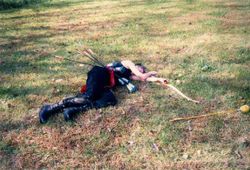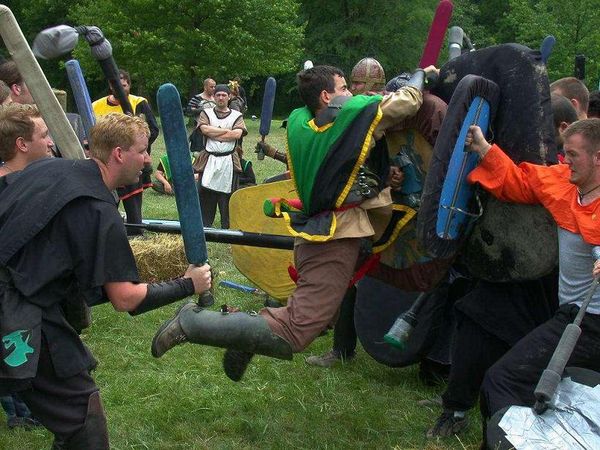Safety

Safety is the primary watchword in Belegarth, however no sport is completely safe. Because of this it is important to keep in mind several basic tips for how to prevent injury to yourself while you are participating in Belegarth.
Preparing to Fight
Keeping yourself safe begins before you even step onto the battlefield. There are several things you should do before you even begin to fight. First you will need to wear the appropriate protective gear. Belegarth does not require participants to wear any protective gear such as armour or helmets, but almost everybody wears at least a minimum of safety equipment. Kneepads are very important to wear because of the amount of time fighters spend on their knees while fighting. They are also very important because of the trauma the knees take while they are fighting and moving while down on a leg. Soft volleyball kneepads work very well for Belegarth. It is important to bear in mind that rigid plastic kneepads count as leather armour for grappling purposes. Other protective gear that many people wear include knee and wrist braces, sports glasses, boots with good ankle support, gloves, and protective cups for men and sports bras for women. Bug repellant may be a good idea depending on where you fight and sunscreen is always recommended if you are fighting in the sun for a long period of time.
After you are in garb and wearing the appropriate safety gear, there are a few other things you should consider before taking the field. You should remove any jewelry that might catch on a weapon or fall off while on the field. Rings, watches, earrings, and many other piercings should be removed. You should also remove anything from your pockets that would be unpleasant to fall on. This includes keys, wallets, pocket change, etc. If you wear eye glasses you should seriously consider getting contacts or sports glasses. If you already own contact lenses or sports glasses, you should wear them instead of regular glasses. Headshots are not allowed in the rules but they do happen by accident and it is very easy for glasses to be damaged or to cut the wearer’s face when struck. It is important to make sure you have enough water in your system before you start fighting. In addition to drinking plenty of water while fighting, you should also drink plenty of water before starting to fight. Lastly, before you fight you should always stretch. Like any other sport, you are much less likely to injure a muscle or tendon if it has been properly stretched first.
Safety on the Field
Once you have made certain you are properly protected and have removed anything from your person that could injure you, you are ready to take the field! There are some simple things you should avoid doing while fighting that will help keep you safe and uninjured. One of the common mistakes is holding your weapon improperly. Many fighters prefer to place their thumb parallel with the core when holding a sword. This provides additional control over the weapon, however it presents the hazard of jamming the fighter’s thumb when his weapon is struck. New fighters should probably avoid this grip. Shield bashing, grappling, and archery are other common sources for injury; however in these instances the initiator is usually responsible for keeping the opponent safe.
Most of the injuries that occur on the field are one of two types: head and facial injuries or joint injuries. Head injuries occur from accidentally being struck in the head or face by a weapon. New fighters often get struck in the head more often than other fighters for a few reasons. The major reason is that new fighters tend to duck and weave a lot when they fight. While many accomplished fighters have incorporated these movements into their fighting style, they are not generally recommended. Ducking can turn a well aimed arm or torso swing into an unintentional head shot. When you fight, it is best to keep your posture upright so that swings that are aimed for your chest are less likely to strike you in the head.

The second most common kind of injury is a joint injury. This is due to the amount of running and footwork involved in Belegarth. There are three primary ways to protect yourself from joint injuries. First, wear boots with good ankle support. Hiking boots and combat boots are both recommended. Secondly, be very careful about your foot placing if you are fighting on uneven terrain. For regular battles, try to fight on a level, flat playing field. If you are fighting in the woods or in another area with uneven terrain, place your feet carefully. The third way to protect yourself is to wear kneepads and stretch out your joints before and after fighting. Arthritis and tendonitis are serious threats to people who have been fighting for a long time. By following these tips and generally taking care of your body, you can avoid some risks of long term injury, especially if you are still growing.
Battlefield awareness is very important in avoiding injury. Terrain injuries are among the most common and paying attention to what is going on around you will keep you alive and keep you safe. Many times battlefields are not perfectly flat and clear. You should always be aware of where you are in relation to obstacles so you can avoid colliding with them. It is also very important to warn your opponent if you see them backing towards an obstacle without being aware of its presence.
It is often possible to be injured once you are already dead. After you die you should lay on the ground until the battle has moved away from you, then you may sit or exit the field if you wish. Sometimes fighting gets very intense and many people die in a small area. When this happens it becomes difficult for the living fighters to avoid stepping on or kicking the dead fighters. If fighting does not move away from the area quickly the herald should call a hold for the dead fighters to move out of the way. If you ever feel like you are going to be stepped on or kicked you should curl into the fetal position and protect your head with your arms. If you are getting trampled on anyway, call a hold for the dead to clear.
Lastly, you should always use common sense when fighting. Avoid doing things that could injure yourself or others. Most unusual accidents that occur while fighting are because somebody was not thinking and did something they should not have. Fighting while injured should also be avoided. The best way to re-injure yourself and prevent yourself from fighting for a long time is to fight before you have completely healed. You should not fight if you have anything sore, sprained, broken, or jammed. Following these simple guidelines while fighting will help keep you and the people you fight with safer!

